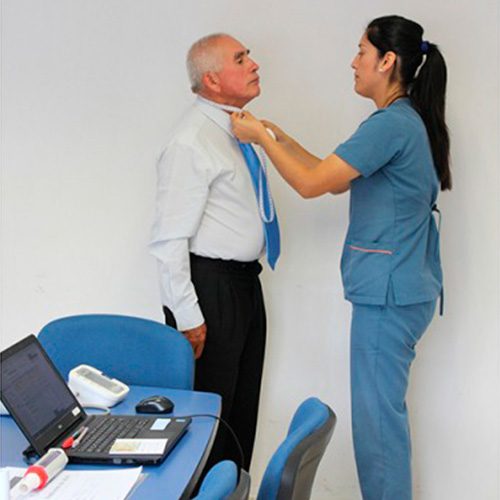MAUCO project: Epidemiological cohort of Molina has a 86% of advance

This study seeks to know the natural history of aging and chronic diseases more prevalent particularly cardiovascular diseases and cancer.
In 1948, in the towns of Framingham and Newton, in Massachusetts (USA), It took out one of the most important epidemiological studies on cardiac and vascular peripheral pathology. The "Framingham" cohort consisted of 5,209 men and women, between the ages of 30 and 60, that it had not developed symptoms of any cardiovascular disease, suffered a stroke or heart attack, they were studied for years, yielding results, that you were later called as "risk factors".
Thus here, in Chile, specifically in the commune of Molina (Maule region), a cohort with a target population that doubles the North American population since the end of January 2015, called project MAUCO, which seeks to study what factors influence or prevent the development of the major chronic diseases that affect our population: Diseases Cardiovascular, Diabetes, Obesity, respiratory diseases, dementia and cancer.
Participating in this research professionals and students in pre and post degree of the Pontifical Catholic University of Chile (PUC), University of Chile (UCh) and the Catholic University of the Maule (UCM). MAUCO is a central project of the first Centre for advanced chronic diseases in Chile (ACCDiS ).
In this context, the Dr. Laura Andrea Huidobro, Academic Department science preclinical of Faculty of medicine UCM, reported that there are 9,99 participants recruited in total; 8 thousand 596 are on exams (of a goal of 10,000 with exams), i.e., the study has 86% progress. All this, 6 thousand 401 participants are tracked for the second year.
WHY MOLINA??
It is the first time in Chile that a study of these scopes is carried out and for a given period of 10 years. According to researchers at ACCDiS, the Maule Region has the highest national prevalence of cardiovascular disease and gastric cancer. Commune of Molina that was chosen for this reason, In addition to having the highest national rates of cardiovascular diseases, stomach cancer and gallbladder cancer, It is a municipality with low migration and high participation of the population in health, which makes it very attractive for such studies.
DISCOVERIES
In terms of the progress, Dr. Huidobro said that, with the current data, "we know that women report worse perception of health than men, and they have more diabetes than men, but slightly lower prevalence of hypertension (20% less)”. On the other hand, examined women reported more history of cancer than men (65% more), also two times more digestive diseases, particularly symptoms of gallbladder.
"They report major respiratory diseases (35% more) and Musculoskeletal disease (69% more). The men reported drinking more alcohol (2,6 times), more risky alcohol consumption (2,4 times), and double the excessive consumption of alcohol. The men also reported higher consumption of sugar-sweetened drinks (2,3 times), processed meats (1,3 times), and lower consumption of vegetables (0,8 times). Men and women reported similar levels of smoking, However, more men have quit smoking (1,5 times)”, noted researcher of the UCM.
To date, the study found that symptoms of depression were more in women (twice as much), in men.
Men have 39% more hypertension than women, and more alterations of electrocardiogram; While they are more obese, they have fewer teeth, lower respiratory flow capacity and lower strength than men.
FATTY LIVER
The examination of ultrasonography practiced the population objective, It showed a high prevalence of fatty liver in men and women, but women have greater disease of gallbladder (41,2% versus 17,2%), and higher rate of cholecystectomy for gallstones (2,1 versus 0,87). "Even though that men report less diabetes, they have more abnormal blood sugars and worst levels of lipids and liver enzymes. Women have a higher prevalence of metabolic syndrome (16% more), However, the men have levels of cardiovascular risk according to Framinham (14,9 times greater)”, said the doctor.
Finally, Thanks to MAUCO, there have been 907 hospitalizations, not counting the obstetric, and the main causes of hospitalization were digestive (27%), Genitourinary (16%), cancer (13%) and circulatory diseases (10%), being the main factor of risk of hospitalizations obesity.
